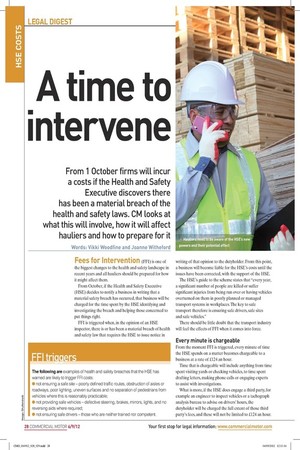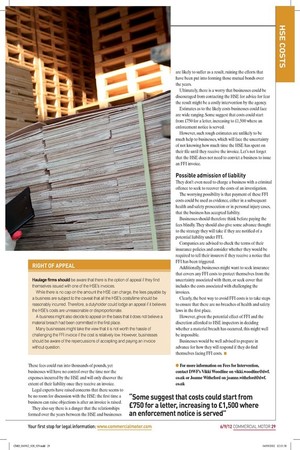A time to intervene
Page 21

Page 22

If you've noticed an error in this article please click here to report it so we can fix it.
From 1 October firms will incur a costs if the Health and Safety Executive discovers there has been a material breach of the health and safety laws. CM looks at what this will involve, how it will affect hauliers and how to prepare for it
Words: Vikki Woodfine and Joanne Witheford Fees for Intervention (FFI) is one of the biggest changes to the health and safety landscape in recent years and all hauliers should be prepared for how it might affect them.
From October, if the Health and Safety Executive (HSE) decides to notify a business in writing that a material safety breach has occurred, that business will be charged for the time spent by the HSE identifying and investigating the breach and helping those concerned to put things right.
FFI is triggered when, in the opinion of an HSE inspector, there is or has been a material breach of health and safety law that requires the HSE to issue notice in writing of that opinion to the dutyholder. From this point, a business will become liable for the HSE’s costs until the issues have been corrected, with the support of the HSE.
The HSE’s guide to the scheme states that “every year, a signiicant number of people are killed or suffer signiicant injuries from being run over or having vehicles overturned on them in poorly planned or managed transport systems in workplaces. The key to safe transport therefore is ensuring safe drivers, safe sites and safe vehicles.” There should be little doubt that the transport industry will feel the effects of FFI when it comes into force.
Every minute is chargeable
From the moment FFI is triggered, every minute of time the HSE spends on a matter becomes chargeable to a business at a rate of £124 an hour.
Time that is chargeable will include anything from time spent visiting yards or checking vehicles, to time spent drafting letters, making phone calls or engaging experts to assist with investigations.
What is more, if the HSE does engage a third party, for example an engineer to inspect vehicles or a tachograph analysis bureau to advise on drivers’ hours, the dutyholder will be charged the full extent of those third party’s fees, and these will not be limited to £124 an hour. These fees could run into thousands of pounds, yet businesses will have no control over the time nor the expenses incurred by the HSE and will only discover the extent of their liability once they receive an invoice.
Legal experts have raised concerns that there seems to be no room for discussion with the HSE: the irst time a business can raise objections is after an invoice is raised.
They also say there is a danger that the relationships formed over the years between the HSE and businesses are likely to suffer as a result, ruining the efforts that have been put into forming those mutual bonds over the years.
Ultimately, there is a worry that businesses could be discouraged from contacting the HSE for advice for fear the result might be a costly intervention by the agency.
Estimates as to the likely costs businesses could face are wide ranging. Some suggest that costs could start from £750 for a letter, increasing to £1,500 where an enforcement notice is served.
However, such rough estimates are unlikely to be much help to businesses, which will face the uncertainty of not knowing how much time the HSE has spent on their ile until they receive the invoice. Let’s not forget that the HSE does not need to convict a business to issue an FFI invoice.
Possible admission of liability
They don’t even need to charge a business with a criminal offence to seek to recover the costs of an investigation.
The worrying possibility is that payment of these FFI costs could be used as evidence, either in a subsequent health and safety prosecution or in personal injury cases, that the business has accepted liability.
Businesses should therefore think before paying the fees blindly. They should also give some advance thought to the strategy they will take if they are notiied of a potential liability under FFI.
Companies are advised to check the terms of their insurance policies and consider whether they would be required to tell their insurers if they receive a notice that FFI has been triggered.
Additionally, businesses might want to seek insurance that covers any FFI costs to protect themselves from the uncertainty associated with them, or seek cover that includes the costs associated with challenging the invoices.
Clearly, the best way to avoid FFI costs is to take steps to ensure that there are no breaches of health and safety laws in the irst place.
However, given the potential effect of FFI and the discretion afforded to HSE inspectors in deciding whether a material breach has occurred, this might well be impossible.
Businesses would be well advised to prepare in advance for how they will respond if they do ind themselves facing FFI costs. ■ • For more information on Fees for Intervention, contact DWF’s Vikki Woodine on vikki.woodine@dwf. co.uk or Joanne Witheford on joanne.witheford@dwf. co.uk
FFI triggers
The following are examples of health and safety breaches that the HSE has warned are likely to trigger FFI costs: • not ensuring a safe site – poorly defined traffic routes, obstruction of aisles or roadways, poor lighting, uneven surfaces and no separation of pedestrians from vehicles where this is reasonably practicable; • not providing safe vehicles – defective steering, brakes, mirrors, lights, and no reversing aids where required; • not ensuring safe drivers – those who are neither trained nor competent.
RIGHT OF APPEAL
Haulage firms should be aware that there is the option of appeal if they find themselves issued with one of the HSE’s invoices.
While there is no cap on the amount the HSE can charge, the fees payable by a business are subject to the caveat that all the HSE’s costs/time should be reasonably incurred. Therefore, a dutyholder could lodge an appeal if it believes the HSE’s costs are unreasonable or disproportionate.
A business might also decide to appeal on the basis that it does not believe a material breach had been committed in the first place.
Many businesses might take the view that it is not worth the hassle of challenging the FFI invoice if the cost is relatively low. However, businesses should be aware of the repercussions of accepting and paying an invoice without question.











































